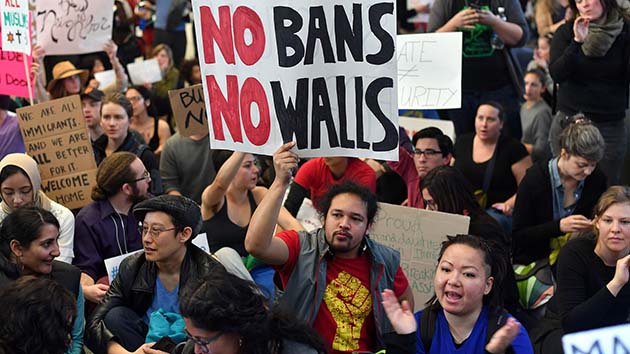Adam Adelpour explains how tackling the rise of racism and the far right, the threat of climate change and growing inequality requires a fight against the system itself
Political chaos and instability are spreading across the globe.
Racism and the far right are on the rise almost everywhere. Donald Trump, the racist bigot that sits in the White House, is determined to spread racist poison and encourage this worldwide.
Following the longest government shut-down in US history he has now declared a national emergency to seize funding for his border wall with Mexico.
Last year Hungary’s government won the election after blaming Jewish financiers for the country’s problems. Italy’s new Interior Minister Matteo Salvini, head of the far right League, has declared, “The good times for illegals are over. Get ready to pack your bags”.
And in Brazil, Jair Bolsonaro, a far-right bigot and supporter of the country’s former dictatorship, is now president. He has referred to black activists as “animals” that should “go back to the zoo”.
In Australia, Scott Morrison and the Liberals are desperately channelling Trump’s racism as they slump further and further in the polls. This gives further confidence to the likes of Senator Fraser Anning, who channelled Hitler in one of his parliamentary speeches, calling for a “final solution” for Muslim immigration, and attended a rally against African immigration organised by fascists in St Kilda in January.
Australia’s racist border policies have provided a shocking source of inspiration. In 2018 Denmark announced they would use Lindholm Island as a dumping ground for refugees.
A system of crisis
The horrifying rise of the far right has been part of the fall-out from the Global Financial Crisis (GFC) in 2008. It was the worst economic crisis since 1929 and brought the world financial system to the brink of collapse.
In order to prevent a complete economic meltdown governments around the world spent hundreds of billions bailing out the banks that caused the crisis. Goldman Sachs, which had taken bailout money, was still paying record bonuses to criminal bankers the year after the crash.
Meanwhile ordinary people around the world were hit hard. There was skyrocketing unemployment and savage cuts to schools, hospitals and social services as governments sought to claw back the money they spent on bank bailouts. This was especially the case in Europe.
The misery this created has accelerated disillusionment with mainstream political parties. The onslaught came off the back of decades of pro-business attacks on living standards.
Both mainstream conservative and Labor-type parties have resorted to racism to try and sell their attacks on workers.
In country after country, governments have pedalled lies about migrants and refugees stealing jobs and resources to deflect blame away from themselves. This has given far right ideas legitimacy.
For decades scientists have been warning about the danger of climate change, yet governments around the world have failed to take serious action. The impact of climate change is becoming dramatically clear, with record breaking heat and extreme weather events worldwide.
Late last year the IPCC climate science report warned there were only 12 years left to avoid worst case scenarios. It said that “rapid, far-reaching and unprecedented changes in all aspects of society” were needed to avert disaster. Australian Defence Force strategy papers warn of rising temperatures, sea-level rises, food shortages, instability and the permanent large scale displacement of populations from Island states like Kiribati and Tuvalu.
Capitalism isn’t working
The roots of these problems lie in the capitalist system itself.
This is a system run in the interests of a tiny minority of capitalists at the expense of the overwhelming majority of people. This year Oxfam reported that the 26 richest people in the world own the same amount of wealth as the world’s poorest 3.8 billion people.
This inequality is getting worse. In Australia, the share of total income going to the top 1 per cent has nearly doubled since the early 1980s.
This super-rich minority depend for their wealth on control of the massive multinational corporations and the land, factories, mines and offices they run. Capitalism is a system where the sole motive for production and investment is profit.
As a result it is incapable of meeting the basic needs of ordinary people and the planet. Around 800 million people, or 10 per cent of the world’s population, is chronically undernourished, according to the UN Food and Aid organisation. Yet the world produces more than enough food for everyone.
Governments around the world have failed to act on climate change because the oil companies and mining giants make billions of dollars from digging up fossil fuels.
Capitalism is also a self-destructive system that goes into periodic economic crises that devastate millions of people’s lives.
There have been major economic crises throughout its history, from the 1890s, to the 1930s to the mid-1970s. The world economy has still not recovered from the 2008 crisis, and there are fears that another crisis is not far away.
Another world is possible
But the system also generates resistance that has the potential to get rid of capitalism altogether.
Over the last 150 years there has been wave after wave of revolt—from the student uprising in Paris in 1968 that detonated a general strike and weeks of factory occupations, to the Arab revolutions that toppled dictatorships in 2011.
More recently, in France we have seen hundreds of thousands of people demonstrate as part of the weeks of Yellow Vest demonstrations against neo-liberal policies of the Macron government.
In October last year, 250,000 people marched in Berlin against racism and the neo-Nazi Alternative for Germany party.
In January, up to 150 million Indian workers held the biggest strike in history for an end to casualisation and privatisation and an increase to the minimum wage.
The system forces the overwhelming majority of people to sell their labour in order to get the money they need to survive. Workers are constantly forced to defend their living standards against the drive for profit, against sackings, wage cuts and speed ups.
The system concentrates workers in huge numbers in giant workplaces- with their hands on society’s most powerful levers—controlling electricity, ports, public transport and the operation of the banks.
This means workers have the power to paralyse capitalism through stopping production and bringing a halt to the flow of profits.
It is this power that Karl Marx saw as essential to destroying capitalism and replacing it with socialism. Capitalism, he said, “creates above all its own gravediggers”.
Marx and Engels were revolutionaries committed to deeds, not just words. Their argument was simple. It is only by putting production under democratic control that the incredible technology humanity has produced can be used for human need rather than profit.
Socialism requires revolution because—as Marx explains in the Communist Manifesto, “the working class cannot simply lay hold of the ready-made state machinery and wield it for its own purposes”.
The military, police, prisons, courts and capitalist parliaments are tied to the ruling class through a thousand golden threads. The elite who run these institutions are thoroughly committed to the system and have nothing in common with those that suffer under capitalist rule.
In recent years, alongside the growth of the far right, there has been a wave of support for new left-wing leaders and parties in a number of countries—like Labour leader Jeremy Corbyn in the UK, Syriza in Greece, Podemos in Spain and Bernie Sanders and Alexandra Ocasio-Cortez in the US.
A number of them even call themselves socialists. But left-wing governments that come to power through parliament are at the mercy of capitalists, because they don’t control the wider economy or the state machine.
Most real power lies outside of parliament, with the corporations and the super-rich top 1 per cent. Their control of the bulk of the economy means their decisions can see whole companies shut down and thousands of workers sacked—as well as radical government destroyed.
In Greece, Syriza was a left-wing party elected in 2015 to oppose vicious government cuts. But it capitulated in the face of threats from bankers and the European Union to cripple its economy—accepting even more savage austerity measures.
The only road to socialism is struggle from below—through strikes, mass demonstrations and workers’ control in the factories and offices.
In the 1917 Russian Revolution, workers’ councils, made up of delegates directly elected from workplaces, overthrew capitalism for the only time in history so far. Workers threw out their bosses and began running factories themselves. Peasants got rid of their landlords and seized control of the land. The revolution granted freedom to Russian colonies and introduced rights for women and LGBTI people in advance of anywhere else in the world at the time.
It survived just a few short years before it was crushed by Stalin’s dictatorship under the pressure of isolation and foreign invasion.
But it showed how in periods of mass strikes and social movements the working class can create new forms of mass participatory democracy with the potential to run society—something seen again and again, including in Spain in 1936, Hungary in 1956, Chile in 1973 and Poland in 1980.
The revolution could not have succeeded without the socialists organised together in the Bolshevik party.
We need a socialist organisation today to build the struggles from below into a movement capable of taking on the capitalist system. If you want to end the racism, inequality, and threat to the planet itself that capitalism poses—we urge you to join us.






